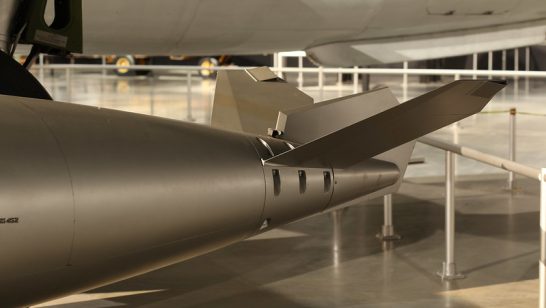
International crises are supposed to last days. Perhaps, like the Cuban missile crisis, they can stretch to weeks or, like the prelude to war in 1914, even months. But the Iranian nuclear crisis, which began with the revelation of secret nuclear sites in 2002, has now lasted a full decade. Although some might consider ten years without war to be a success, it would be foolish to assume we can endure another ten.
As I argue in a new monograph for the Royal United Services Institute (RUSI), Permanent Crisis: Iran’s Nuclear Trajectory, it is now more important than ever that we take advantage of fortuitous diplomatic circumstances and seek a deal with Iran, one which both addresses our basic security concerns and allows Iran to come away with dignity.
The window for nuclear diplomacy between Iran and the West has been open since the reelection of President Barack Obama. But it will start inching shut once more as we approach the Iranian presidential elections of June 2013. After all, the same election-season policy paralysis that grips Washington every four years also afflicts Tehran. Iran’s political system has been especially fragmented during President Mahmoud Ahmadinejad’s second term, and factional competition will intensify. Hillary Clinton, US Secretary of State, has publicly acknowledged this timeline, and indicated that things will heat up by March. Notwithstanding a recent Washington Post report that negotiations could recommence by Christmas, it’s unlikely that talks can get off the ground before January 2013. That leaves a short period – no more than five months, and perhaps as little as three – in which to hammer out an agreement.
Everyone understands what the compromise should look like. The West would offer limited sanctions relief and, despite UN Security Council Resolutions demanding the contrary, would allow Iran to enrich uranium. Iran, in turn, would cap its enrichment to 5 percent, thus excluding the production of uranium enriched to the more dangerous 20 percent (nine-tenths of the way to weapons-grade). Iran would also have to agree to convert its current stockpile to harder-to-enrich reactor fuel, limit its ability to produce more in the future, and – most important of all – agree to intrusive inspections by the IAEA.
The latter is a crucial point. If Iran did seek to dash for a bomb, its main problem would not be getting material, but getting caught. Our policies should be aimed at keeping it that way. Perhaps counterintuitively, then, we should prefer a bigger and more transparent Iranian nuclear programme to a smaller and more opaque one.
Finally, if and when the IAEA gave Iran a clean bill of health, known as a “broader conclusion”, all sanctions could be lifted. The IAEA’s position is that it cannot provide this now, while Iran continues to withhold access to key scientists, facilities, and documents.
Iran may be worried that if it comes clean, it would simply face further punishment. There is a simple solution to this. In return for total transparency, Iran should be offered an amnesty for past transgressions. After all, many countries – South Korea, Taiwan, Sweden, South Africa – have in the past conducted illicit nuclear weapons research, and been forgiven.
The problem, as so often in negotiations, is that each side is convinced,first, that it can outlast the other and, second, that the cost of failure would be disproportionately borne by the other. In keeping with this dynamic, we assume that Iran, creaking under the weight of unprecedentedly tough sanctions, will eventually agree to far greater concessions than those outlined above. This may be a mistake.
First, long-term sanctions can have catastrophic humanitarian and diplomatic effects, as they did in Iraq in the 1990s. In those Western countries spearheading sanctions, there is disturbingly little debate over those consequences.
Second, the longer the crisis stretches on, the greater the risk that Israel, fearful of Iran making unseen advances in the development of a nuclear bomb, launches airstrikes. That would result in Iran expelling inspectors, reconstituting its nuclear programme out of sight, and redoubling its efforts – just as Iraq did after it was bombed by Israel in 1981.
Third, and finally, it may seem desirable that sanctions drive Iranians onto the streets. But such protests, by making the regime more vulnerable, can increase the appeal of a nuclear deterrent and empower hardliners. Over time, Iran would become better placed to find a pretext on which to kick out the IAEA and more incentivised to intensify (or resume, depending on your assumptions) illicit nuclear activity. Moreover, as we found during the 2009 Green Revolution, it can be politically awkward to negotiate with a regime visibly cracking down on its citizens. The core purpose of sanctions is to obtain a better bargaining position – but if sanctions stop you one from bargaining, they are patently counterproductive.
There are also other reasons why we should show flexibility. The Obama administration has already indicated it is willing to engage in direct talks with Iran, but a president is never as politically strong as at the beginning of a second and final term. There are reasons to think that the present obstacle to direct talks is on the Iranian rather than American side, but European allies should be doing all they can to encourage and support bilateral discussions. Elsewhere, the increasingly probable collapse of the Assad regime in Syria will deprive Iran of one of its only true allies. When that happens, Tehran’s stance might harden further.
What all this means is that the P5+1 should meet Iran as rapidly as possible, and put limited sanctions relief on the table in exchange for the range of concessions outlined here. Iran might, of course, simply refuse to go with this script. In that case, we are no worse off than we are now. We would also have tested Iran, and demonstrated that we are negotiating in good faith. But, regardless of Iran’s responsiveness, it would negligent not to make such an attempt. Considering that every internationally recognised nuclear weapons state took less than ten years to produce their bombs, the duration of this crisis is remarkable and troubling.
As more and more American policymakers and officials are acknowledging, and as I explain at length in Permanent Crisis, just waiting Iran out is not a sound strategy. Sanctions may have played a role in forcing Iran back to nuclear talks over the past year, but they can no longer do all the heavy lifting.
The opinions articulated above represent the views of the author(s), and do not necessarily reflect the position of the European Leadership Network or any of its members. The ELN’s aim is to encourage debates that will help develop Europe’s capacity to address the pressing foreign, defence, and security challenges of our time.


